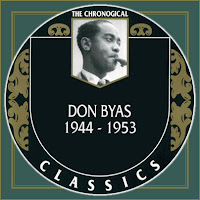 Erroll Louis Garner
Erroll Louis Garner (June 15, 1923 – January 2, 1977) was an American jazz pianist and composer known for his swing playing and ballads. His best-known composition, the ballad "Misty", has become a jazz standard.
Garner's first recordings were made in late 1944 at the apartment of Timme Rosenkrantz; these were subsequently issued as the five-volume Overture to Dawn series on Blue Note Records. His recording career advanced in the late 1940s when several sides such as "Fine and Dandy" and "Sweet 'n' Lovely" were cut. However, his 1955 live album Concert by the Sea was a best-selling jazz album in its day and features Eddie Calhoun on bass and Denzil Best on drums. This recording of a performance at the Sunset Center, a former church in Carmel-by-the-Sea, California, that was to be shared with Korean War veterans at a nearby army base, was made using relatively primitive sound equipment, but for George Avakian the decision to release the recording was easy. Other works include 1951's Long Ago and Far Away and 1974's Magician, both of which see Garner perform a number of classic standards. Often the trio was expanded to add Latin percussion, usually a conga.
In 1964, Garner appeared in the UK on the music series Jazz 625 broadcast on the BBC's new second channel. The programme was hosted by Steve Race, who introduced Garner's trio with Eddie Calhoun on bass and Kelly Martin on drums.
Since Garner could not write down his musical ideas, he used to record them on tape, to be later transcribed by others.

Erroll Garner - 1944 {The Chronological Classics, 802} [77:36]
Erroll Garner - 1944, Vol. 2 {The Chronological Classics, 818} [72:01]
Erroll Garner - 1944, Vol. 3 {The Chronological Classics, 850} [69:54]
Erroll Garner - 1944-1945 {The Chronological Classics, 873} [70:53]
Erroll Garner - 1945-1946 {The Chronological Classics, 924} [56:53]
Erroll Garner - 1946-1947 {The Chronological Classics, 1004} [66:11]
Erroll Garner - 1947-1949 {The Chronological Classics, 1109} [68:58]
Erroll Garner - 1949 {The Chronological Classics, 1138} [67:43]
Erroll Garner - 1949, Vol. 2 {The Chronological Classics, 1182} [64:03]
Erroll Garner - 1949-1950 {The Chronological Classics, 1205} [70:09]
Erroll Garner - 1950 {The Chronological Classics, 1240} [72:50]
Erroll Garner - 1950-1951 {The Chronological Classics, 1310} [71:31]
Erroll Garner - 1951-1952 {The Chronological Classics, 1341} [65:51]
Erroll Garner - 1952-1953 {The Chronological Classics, 1370} [76:00]
Erroll Garner - 1953 {The Chronological Classics, 1391} [73:55]
Erroll Garner - 1953-1954 {The Chronological Classics, 1423} [72:25]
Erroll Garner - 1954 {The Chronological Classics, 1447} [76:13]






















